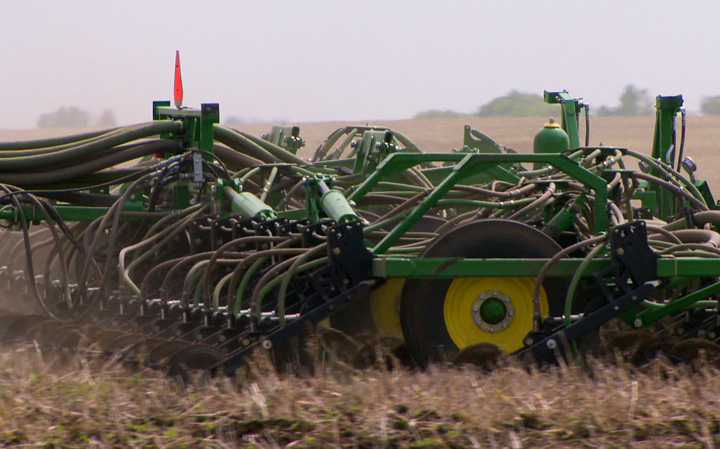More than 70 per cent of farmers in Saskatchewan who took part in a recent survey said the novel coronavirus pandemic has caused or is expected to cause them financial hardship.

The farmers said it could result in lower commodity prices, lower revenue and reduced cash flow. Nearly half said they may not be able to pay their bills.
Another 53 per cent of the 262 farm operations that participated in the Agriculture Producers Association of Saskatchewan (APAS) survey released Monday said cash flow is an immediate financial need.
“Farmers need cash to be able to get their crop in the ground this spring, and after the brutal last couple of years we’ve dealt with, reduced cash flow could really break people,” APAS president Todd Lewis said in a statement.
The federal government said last month that it is providing Farm Credit Canada (FCC) with $5 billion in additional lending capability.
It was also announced at the same time that farmers in the Advance Payment Program with loans due before April 30 will be given an additional six months to make their loan payments.
Lewis said more needs to be done to support farmers.
“Going into even more debt isn’t the answer. Just look south of the border, where agriculture has received huge subsidies for years,” Lewis said.
“Canadian farmers can’t compete with that, especially not during a global crisis like this. If agriculture is essential for the Canadian economy, it’s time for governments to directly invest in our farmers.”
Lewis said that farmers need cash now to get their crops in the ground this spring and said that without support, reduced cash flow could severely impact operations.

Get daily National news
“We’re hearing from farmers that their access to farm inputs like fuel, fertilizer, veterinary services, and seed are already being disrupted,” Lewis said.
“Nearly half of those that responded to the survey also indicated that they’re experiencing delays with being able to sell or deliver what they produce on the farm.”
Lewis said the COVID-19 situation is evolving quickly and APAS is looking for additional input from farmers as the organization lobbies the government for more support.
“We want to collect real-time data from farmers that we can share directly with the government on an ongoing basis,” Lewis said.
“We know that the situation is going to change significantly over time, so we’re asking farmers to complete the survey every week.”
Specifically, APAS is now looking for input about unharvested 2019 crops.
APAS estimates two million acres of crops from last year have yet to be harvested.
“Many farmers were hoping to harvest and sell overwintered crops to pay outstanding bills from 2019,” Lewis said.
“It’s unclear how many still haven’t been able to get their crop in.”
The survey results, as published by APAS, did not contain information about the methodology or margin of error or equivalent.
— With a file from Mickey Djuric
Questions about COVID-19? Here are some things you need to know:
Health officials caution against all international travel. Returning travellers are legally obligated to self-isolate for 14 days, beginning March 26, in case they develop symptoms and to prevent spreading the virus to others. Some provinces and territories have also implemented additional recommendations or enforcement measures to ensure those returning to the area self-isolate.
Symptoms can include fever, cough and difficulty breathing — very similar to a cold or flu. Some people can develop a more severe illness. People most at risk of this include older adults and people with severe chronic medical conditions like heart, lung or kidney disease. If you develop symptoms, contact public health authorities.
To prevent the virus from spreading, experts recommend frequent handwashing and coughing into your sleeve. They also recommend minimizing contact with others staying home as much as possible and maintaining a distance of two metres from other people if you go out.
For full COVID-19 coverage from Global News, click here.












Comments